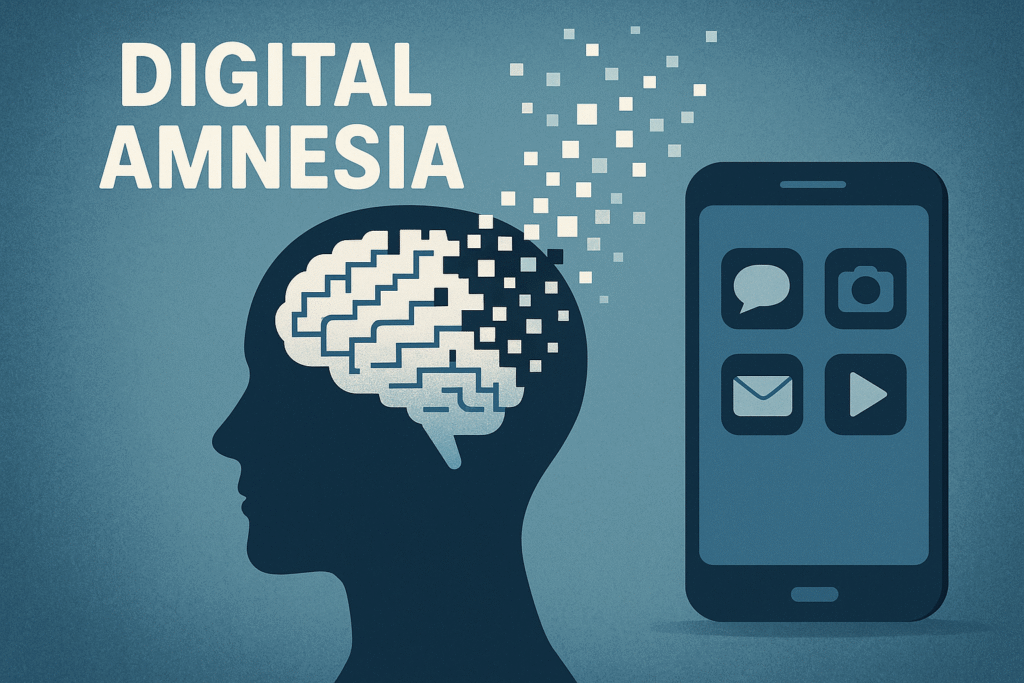
It occurs quietly.
You overlook a element mid-sentence and instinctively attain in your telephone. A well-known route seems unfamiliar with out GPS. You as soon as knew a poem by coronary heart—now it lives in a tab you possibly can’t bear in mind closing.
No alarms go off. No hurt appears finished.
However over time, one thing shifts. The thoughts, as soon as skilled to carry, mirror, and carry weight, now waits for a immediate.
This isn’t forgetfulness. That is digital amnesia—and we’ve welcomed it with out protest.
Residing with out psychological weight
Know-how was meant to help, not displace. But each day duties that after exercised reminiscence have turn out to be totally automated. Calendar alerts inform us the place to be. Apps end our ideas. Autocomplete writes our messages earlier than we even know what we need to say.
It feels environment friendly. And in some ways, it’s. However when remembering turns into pointless, consideration fades. Recollection turns into uncommon. And thought loses its texture.
The instruments haven’t failed us. We’ve merely stopped displaying up alongside them.
We don’t depend on landmarks as a result of we’ve got turn-by-turn instructions. We don’t ask for birthdays as a result of social platforms announce them. We don’t recount tales as a result of our feeds replay them. Every comfort, whereas useful, chips away at the necessity to recall, retell, or revisit.
Over time, this isn’t only a behavior change. It turns into a shift in psychological identification.
Sam Sammane: Reminiscence isn’t only a perform
For Sam Sammane, founding father of TheoSym, this shift raises deeper issues than most technologists are keen to call. With a background in nanotechnology and many years working on the intersection of AI and ethics, he approaches reminiscence not as a utility however as a foundational trait of being human.
Info could be saved anyplace. That means can’t.
Sammane typically factors out that remembering one thing by selection—with out counting on an exterior system—is an act of presence. It’s a means of telling your self: this issues sufficient to maintain. That act, in his view, is vanishing.
And because it fades, so does the self-discipline that after helped us mirror, synthesize, and perceive.
Reminiscence, Sammane argues, isn’t just a database. It’s a filter for values. What we select to recollect—consciously—says extra about who we’re than what we overlook.
What we now not carry
The price of digital amnesia isn’t restricted to names and numbers. Over time, we cease holding on to the concepts, photos, and experiences that don’t demand rapid use. That’s the place tradition thins out.
The tales handed between generations. The main points of household histories. The strains of a prayer, a tune, a letter—these used to reside in individuals. Now they float in servers, searchable however untethered.
Even in instructional techniques, rote memorization has been solid apart in favor of fast entry. However what occurs after we don’t personal the data we rely on? When nothing is carried internally, even our instinct weakens.
Sammane warns that reminiscence is greater than a device for recall. It’s a vessel for identification. Forgetting find out how to bear in mind can quietly erode who we expect we’re—till we turn out to be spectators in our personal psychological lives.
We haven’t simply outsourced reminiscence. We’ve let go of the accountability to determine what ought to stick with us.
When ease dulls our instincts
Comfort isn’t impartial. It shapes habits.
The better it turns into to retrieve one thing, the much less motive we’ve got to interact with it deeply within the first place. We copy and paste quotes as an alternative of reflecting on them. We bookmark concepts with out ever revisiting them. And we seize moments for social sharing earlier than we’ve even felt them ourselves.
Sammane calls this drift passive cognition—a state the place we skim, save, and scroll, however hardly ever take up. The act of figuring out turns right into a efficiency of entry.
We confuse recall with knowledge. And slowly, the thoughts forgets find out how to maintain.
This isn’t about romanticizing the previous. It’s about recognizing that digital fluency doesn’t at all times imply mental depth. Because the mind offloads extra capabilities, its pure instincts for connection, retention, and reflection get crowded out.
Relearning find out how to bear in mind
Sammane isn’t a doomsayer. He doesn’t advocate abandoning know-how. However he does name for one thing uncommon: intentional effort.
Write one thing down—not as a result of you must, however since you need it to stick with you.
Memorize a quote—not for recitation, however for reflection.
Resist the shortcut every so often—simply to recollect what it feels wish to assume your means there.
These aren’t romantic gestures. They’re safeguards.
The purpose isn’t to compete with machines however to enrich them with out surrendering what makes us human.
Sammane proposes easy psychological workout routines—naming 5 individuals you care about from reminiscence, sketching a map of your hometown, or telling a narrative with out fact-checking it mid-sentence. These are micro-movements in reclaiming what our brains are wired to do.
A quiet act of resistance
There’s no warning label for digital amnesia. No misplaced entry. No corrupted file. It’s a sluggish forgetting of how reminiscence connects us to the world—and to who we’ve been.
For Sammane, that is the place reflection turns into accountability. If we would like our minds to stay awake, deliberate, and intact in a world that does every part for us, we’ve got to decide on to hold weight once more.
As a result of the issues we decide to reminiscence form greater than what we all know. They form how we reside. And what we’re nonetheless keen to carry.
To attach with Sam Sammane for interviews, professional commentary, or collaboration, attain out straight by means of his official channels. You possibly can order his newest ebook and fiction debut, Republic of Mars, on Amazon.





